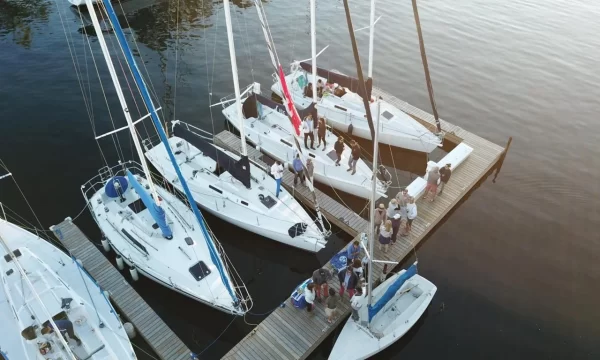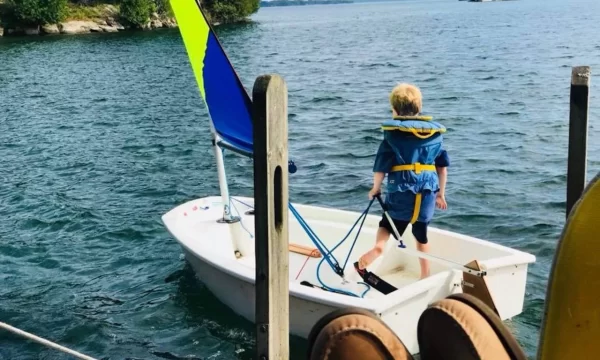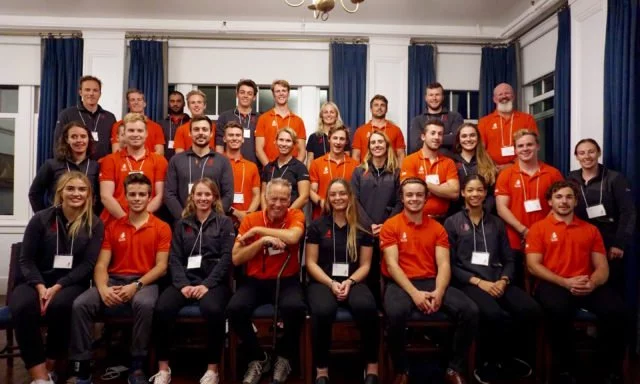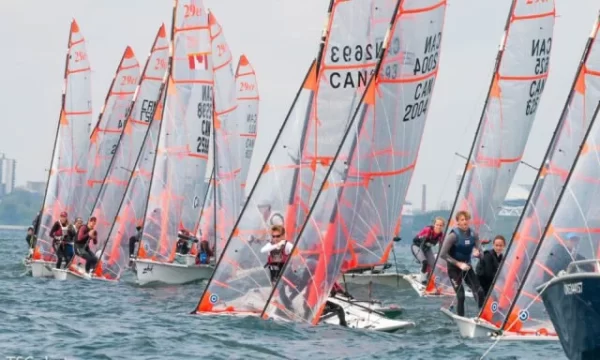Tom Ramshaw caps a comeback by qualifying for the Medal Race in Finn
Kingston, August 1, 2021 ÛÒ At her first Olympic Games, Sarah Douglas achieved Canada’s best individual performance in women’s sailing in Olympic history by finishing in 6th position overall in Laser Radial in Tokyo. In the Medal Race held overnight Saturday into Sunday (Eastern Time), Sarah Douglas from Toronto took 9th position in the Laser Radial final race to finish 6th overall. ÛÏIÛªm a bit disappointed, but IÛªm still really proud of what I did this past week, in that I had an opportunity to win a medal and make history for Canada. Regardless of the results and considering I’m without a medal, I’m still very, very proud of what I’ve done,Û said Sarah Douglas. ÛÏIt was a very challenging race. It was so back and forth and the conditions were very challenging. I found myself a little bit at the back, where I didn’t want to be, but it is what it is and every medal race has its challenges. There’s always mistake that you think about, but overall, I think the way I handled myself and my mindset really put me in a good position. So, no regrets!Û Nikola Girke previously had Canada’s best individual result in women’s sailing at the Olympic Games with a 10th-place finish in RS:X at the London Games in 2012. Sarah Douglas became the first Canadian to take part in the Medal Race of the Laser Radial class since this event was introduced to the Olympic Games program in 2008 in Beijing. The best Canadian result in Laser Radial so far had been Brenda Bowskill’s 16th-place finish in Rio in 2016. Before the Laser Radial was introduced, one other single-handed event for women was held at the Olympic Games from 1992 to 2004 inclusively, named WomenÛªs Single Handed Dinghy Europe. The best Canadian result in that event was earned by Beth Calkin in 2000 in Sydney, with an 11th-place finish. Tom Ramshaw qualifies for Medal Race In the Finn event, a huge comeback by Tom Ramshaw earned him a spot in the Medal Race to be held overnight Monday into Tuesday (ET). Placed 12th overall before the last day of the preliminary races, Ramshaw started out by finishing 13th in the ninth race of the competition. Entering in 13th spot and 10 points away from the 10th position, which he needed to get to in order to take part in the Medal Race, he finished in 2nd place to qualify with 80 points. He is currently eight points away from the 9th position. ÛÏToday was another decent day. I had to make up some points to have a chance to get into the Medal Race,Û said Tom Ramshaw. ÛÏI took a little more risk, having nothing to lose, really. It didn’t pay off in the first race, but then, it did pay off in the second race and I got second place. It was just enough points to squeeze into the top 10 and I’m really happy about that. And now, I’m just gonna give it my best in the Medal Race and hopefully I can move up in the standings a little bit more.Û This is the first time since the 2012 Olympic Games that Canada has two sailors take part in Medal Races. In London, both RS:X athletes, Zachary Plavsic and Nikola Girke, raced in the final event as top 10 athletes following the preliminary races. Tom Ramshaw’s top 10 finish will also be the best Canadian performance at the Olympic Games in the Finn event since Chris Cook finished 5th overall in Beijing in 2008. The Medal Race In every Olympic Sailing event, sailors first take part in 10 (Laser, Laser Radial, Finn) or 12 (49er, 49er FX, RS:X, Nacra 17 Foiling) preliminary races. For each of these races, sailors are scored by the position in which they finish (for instance: 1 point is awarded for position 1) for a cumulative ranking. The worst result registered by each competitor/team is discarded. The top 10 athletes or teams following these preliminary races qualify for the Medal Races, a single race where only the top 10 athletes take part and in which points are doubled. The sailor with the lowest point total at the end of competition wins the title, as points that they earned during the preliminary races are carried forward with them into the medal race. Sailing fans can watch Tom Ramshaw race: 1. Through the live stream offered by CBC Sports (https://www.cbc.ca/sports/olympics/summer/sailing/streaming-schedule) and Radio-Canada Sports (https://ici.radio-canada.ca/jeux-olympiques/sport/voile); 2. Through a Live Online Tracking tool available on Sail Canada’s website at https://www.sailing.ca/events/2020-olympic-games/ (Live Tracking tab); 3. In replay mode at CBC.ca (https://www.cbc.ca/player/sports/olympics/sailing) or Radio-Canada.ca (https://ici.radio-canada.ca/jeux-olympiques/sport/voile). More info is available through Sail Canada’s website at https://www.sailing.ca/. About Sail Canada Established in 1931, Sail Canada is the national governing body for the sport of sailing in the country. Sail Canada is a leading international sailing nation, proud of its world class athletes, lifelong participants and inclusive culture. The organization and its members are committed to excellence by developing and training its leaders, athletes, sailors, instructors, coaches and officials. With the valued support from our partners, the Provincial Sailing Associations and our member clubs, schools, organizations and stakeholders, sailing is promoted in all its forms. By setting standards and delivering programs from home pond to podium for Canadians of all ages and abilities, from dinghies to keelboats, cruising to navigation, windsurfing to powerboating and accessible sailing, Sail Canada sets sail for all, sail to win and sail for life. A sport in the Olympic program since the first Games in 1896, except in 1904, the pursuit of success in these Games is what fuels the focus of Sail Canada as Canadian athletes have so far achieved nine Olympic and five Paralympic medals.





